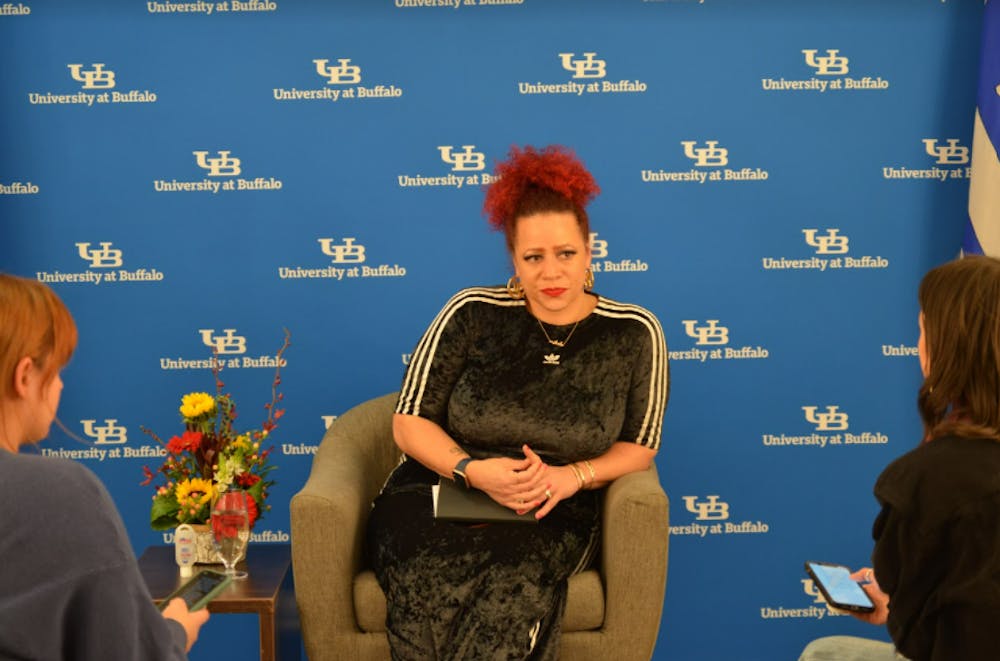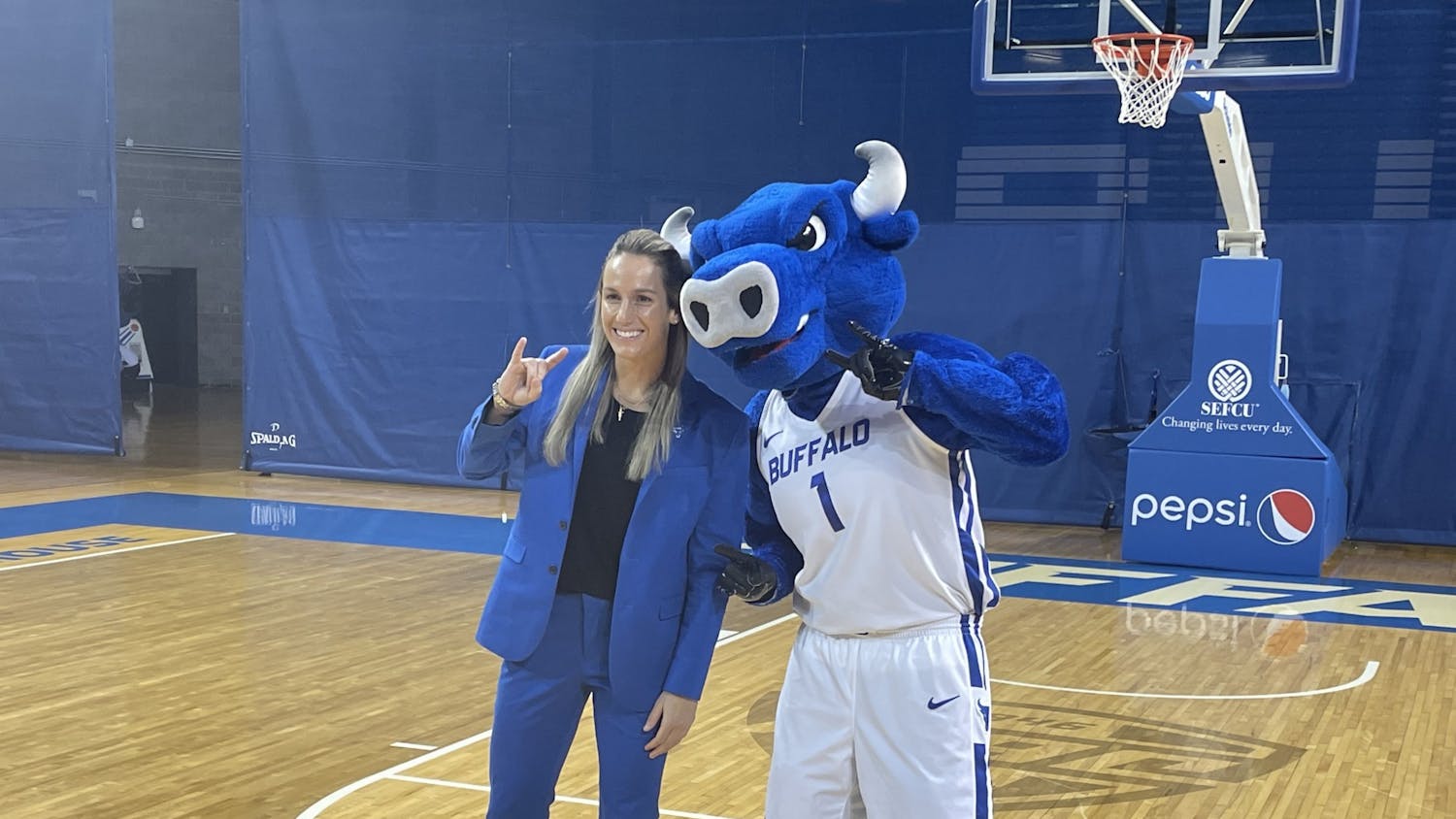Nikole Hannah-Jones is not in the business of making people comfortable.
The 46th Martin Luther King Jr. Commemoration Keynote Speaker wore a black Adidas ankle-length velour dress accented from head to toe with pops of red, from her dyed-red hair to her classic black-and-white Nike Dunks with a red swoosh. She donned large gold hoop earrings and a gold jewel-encrusted name-plate necklace. Calm, cool and collected, Hannah-Jones knows that her journalism, often regarding the lives and experiences of Black Americans, can lead to some controversial conversations.
And she likes it that way.
Hannah-Jones is a Pulitzer Prize-winning investigative journalist, activist and staff writer for The New York Times Magazine. She co-founded the Ida B. Wells Society for Investigative Reporting — an organization dedicated to serving and supporting journalists of color — and founded The 1619 Project — a NYT Magazine initiative that aims to refocus conversations regarding American history on the contributions of Black Americans and the consequences of slavery.
Hannah-Jones sat down with The Spectrum before her appearance as part of the 35th annual Distinguished Speaker Series to talk about race and becoming informed citizens:
The Spectrum: College campuses are a huge hub for gathering people with different backgrounds and worldviews. What advice would you give students who are trying to take part in difficult conversations on campus?
Nickole Hannah-Jones: “You should always try to maintain openness. Understanding that people are in different places in their journey, they have different levels of understanding, they have different experiences. And if you’re going to engage in these conversations, then you have to be willing to allow people to make mistakes in the conversation, and at the same time, you should also have humility. You don’t know everything and there are people who have had a very different experience of America than you. So if you engage with openness and humility, that will go a long way.”
TS: How do you think we, as students and future decision makers, can work toward becoming better informed citizens?
NHJ: “Read a lot more, I really do mean that. I think part of the response to The 1619 Project has been people have realized how little they actually know about the society they live in. And we’re also distracted with so many things that are pulling our attention. I think we have to consume a lot more knowledge and talk about it.”
TS: For this DSS, you’re the Martin Luther King Jr. Keynote Speaker. How do you handle professionals and colleagues in your industry who disagree with the work that you’re doing?
NHJ: “As a journalist, to me, if you are producing journalism that everyone agrees with, you probably haven’t done your job very well. I personally didn’t get into journalism to make people comfortable. I think you have to respect that people disagree. And you have to decide which criticism is worthy of considering. And we should all be reflecting on our work and not be defensive of everything. And then some criticism is not worthy, and if you follow me on Twitter, how I deal with that depends on the day. But I just think all of us, and especially now as we see really, really low numbers of Americans who trust journalists, we have to be open to criticism, and we have to be open to critique and we have to take it seriously. If you aren’t respecting your readers — and that doesn’t mean you ultimately agree with the criticism — but if you’re not willing to take that seriously there’s no way that we’re ever going to have high levels of trust in our profession again.”
TS: What advice do you have for young journalists of color who are preparing to enter the journalism industry?
NHJ: “One, you’re very needed. Our industry does not reflect our country. And I’m not a person who thinks that this is about political correctness. I think it’s about accuracy. How can you accurately cover a country without newsrooms that reflect the communities that you’re trying to cover? But for young journalists of color, it’s going to be challenging. Our profession likes to think of itself as progressive but we suffer from the same issues that the country that we draw from suffers from. What I always tell young people, but particularly people of color, is you’re never going to be able to control how people see you, how people perceive you, but you can control your own excellence. So spend your time trying to make yourself as undeniable as possible. And then if things don’t go your way, if you run into obstacles, you know that it’s not because it’s something that you could have been doing or should have been doing.”
Kayla Estrada is an assistant news/features editor and can be reached at kayla.estrada@ubspectrum.com
Reilly Mullen is the editor in chief and can be reached at reilly.mullen@ubspectrum.com

Reilly Mullen is the editor-in-chief at The Spectrum. She is a senior majoring in political science with a journalism certificate. She enjoys Dunkin’ iced lattes and Scrabble. A former web, features, news and managing editor, she is a columnist at heart but has covered everything from UB Football to breaking news.

Kayla Estrada is the opinion editor at The Spectrum. She is an English major who enjoys rainy weather, “Bob’s Burgers” and asking people who they voted for. When she’s not writing, she can be found hunting for odd-looking knick-knacks at the nearest thrift store.





